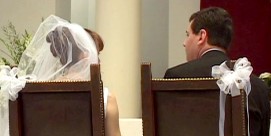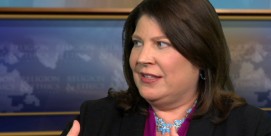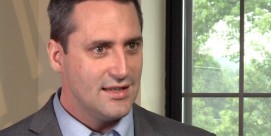BOB ABERNETHY, host: Welcome, I’m Bob Abernethy. It’s good to have you with us for our annual look back at the top religion news stories of 2013. E.J. Dionne is here. He’s a senior fellow at the Brookings Institution in Washington, a columnist for the Washington Post and a professor at Georgetown University. Kevin Eckstrom is the editor-in-chief of Religion News Service, and Kim Lawton is managing editor of Religion & Ethics NewsWeekly. As preparation for our discussion, here is Kim’s survey of the major religion stories of the past year.
KIM LAWTON, correspondent: Less than six weeks into the new year, Pope Benedict XVI made the stunning announcement that he had decided to resign. He was the first pope to do so in 600 years. The College of Cardinals gathered in Rome, and on March 13th, the conclave elected Cardinal Jorge Mario Bergoglio of Argentina as the first Latin American pope and also the first Jesuit pope. He chose the name Francis in honor of Saint Francis of Assisi. Pope Francis proceeded to shake up the Catholic Church with a new tone of openness and emphasis on simplicity and humility. Over the past year, he has stressed the importance of being close to the poor and marginalized, and he has criticized some church leaders for being too focused on a few issues such as abortion and gay marriage. His message has received strong approval from Catholics and non-Catholics alike, although some conservatives have been concerned that he may be leading the church away from traditional stands.
Issues surrounding homosexuality continued to divide many US churches. In 2013, same-sex marriage was legalized in eight more states, bringing the total number to 17. Tensions were heightened when the Supreme Court struck down the Defense of Marriage Act, the federal law which defined marriage as only between a man and a woman. Faith-based supporters of same-sex marriage were pleased by new momentum on the issue, while opponents vowed to continue fighting. Some mainline Protestant denominations, including the United Methodist Church, faced increased pressure to allow their clergy to officiate at gay weddings.
The Affordable Care Act—ObamaCare—continued to generate controversy. While many religious groups argued that the new healthcare law will help low-income people, some, including the US Conference of Catholic Bishops, pushed for more religious exemptions to the requirement that employers provide coverage for contraception. A series of lawsuits filed by businesses and religious institutions were making their way through the court system, with the Supreme Court agreeing to hear two cases this coming spring.
Religious groups actively lobbied Congress on budget issues. A broad faith coalition raised concerns about how sequestration, funding cuts, and the government shutdown were hurting vulnerable families and the poor. Many urged new policies to address growing economic inequality. Some religious conservatives maintained support for budget cuts as a moral issue.
There were also faith-based mobilizations in support of comprehensive immigration reform and new gun control restrictions, although legislation on both was stalled in Congress.
In the wake of the deadly bombing at the Boston Marathon, interfaith leaders pledged a new commitment to unity. News that the alleged perpetrators were Muslims reignited questions about online radicalization of young American Muslims. Some US Islamic leaders also criticized ongoing discrimination against their community, including FBI spying on mosques.
The conflict in Syria, including allegations of the use of chemical weapons, generated an ethical debate about whether the international community had an obligation to intervene with force in order to protect civilians. The ongoing violence created a humanitarian catastrophe. According to the United Nations, about one-third of Syria’s population has been displaced, four million people inside that nation and another two million to other countries, making it one of the worst refugee crises in history. Meanwhile, faith-based relief groups also mobilized to help victims of the massive Typhoon Haiyan in the Philippines, although many were frustrated at the pace of donations for their work.
Sectarian violence was on the rise in many parts of the world: between Sunnis and Shiites in Iraq, Muslims and Buddhists in Myanmar, and Christians and Muslims in Nigeria and the Central African Republic. In several predominantly Muslim countries, there were attacks against the Christian minority, including those in Pakistan and Egypt.
A survey by the Pew Research Center drew attention to the changing nature of Jewish identity in America, trends that were especially pronounced among millennials. Among the findings: almost a quarter of Jews describe themselves as having “no religion.”
Finally, religion did well this year in the world of pop culture. Music, films and books with religious themes were at the top of their respective charts on numerous occasions. Pope Francis, Time magazine’s Person of the Year, was also named the most influential world leader on Twitter and the most-talked about person on Facebook.
ABERNETHY: Kim, thank you for that. I think everybody would agree that Pope Francis is everybody’s runaway first choice for whatever the designation is. E. J., what do you see?
E. J. DIONNE: I think, as Kim showed in her great piece, his impact obviously is enormous on the Catholic Church, but I think it’s also enormous outside the Church. He is already being compared to Pope John XXIII as a great reformer--John XXIII who called the Second Vatican Council and who significantly was lifted up to rapid sainthood by Pope Francis. He is calling on Catholics to embrace the poor and to make poverty a central part, a concern about poverty a central part of the Catholic message. He has been so strong on social justice in his critique on trickle-down economics that he was criticized by Rush Limbaugh as a Marxist. But I think on the religious scale he is also preaching, and this may be an odd term for a head of the Roman Catholic Church, an almost undogmatic universalism where he talks about seeing God in everyone, where he is open to people of all faiths and to nonbelievers. And then the last thing is how he behaves. One of the oddest things sometimes, I think, is to see a Christian actually behave like a Christian, and with all of his actions and gestures he’s showing that he walks this talk in a serious way.
ABERNETHY: But has it been, Kevin, has it been more symbolism than actual change?
KEVIN ECKSTROM: Well, I think with this pope, certainly with the papacy in general style is substance. So yeah, he does some charismatic things and he’s, you know, kind of cool and he’s, you know, as Kim mentioned, you know, really big on Facebook and Twitter, but he is, I mean, it is genuine and I think that’s what has captured people’s imagination about him. It’s not that he just preaches something, but he seems to live it. And I think one of the most fascinating things about him is that he’s really challenging the Catholic Church to reimagine its place in the world and how it sees itself, but also inviting outsiders to take a sort of a second look at the Catholic Church. I mean, he is a pope who said I don’t believe in a Catholic God, I just believe in God. And he’s called proselytism "silly." So, I mean really revolutionary things that this pope is saying.
LAWTON: And we should mention that some of that revolutionary character is generating some controversy. I mean, there are some Catholics, conservative Catholics, who are a little uncomfortable, anxious, wondering what’s going on. When this pope said we’ve been too obsessed with certain issues like gay marriage and abortion, well, that troubles people who think that those issues are really important, and they should be focused on. So it’s been interesting to watch that. I think many conservatives love the fact that he’s making the Catholic Church seem cool again. And, you know, this whole idea of "evangelization," of bringing people in, although we don’t know how many people have actually come in because of him, but there is this edge of controversy and people, some people not liking where he’s taking the Church.
DIONNE: You know, I think that’s really important. First of all, who ever thought that the term “cool” would be widely applied to a pope…
LAWTON: Right.
DIONNE: …and that is what’s happening right now. And I think conservatives are struggling. I think there is a whole body of conservatives who say, look, he hasn’t the Church’s view on abortion or on gay marriage, and yet there are others who are worried both about some of the doctrinal questions and clearly the emphasis has shifted. It’s really striking, I have found, how much gay people have responded to this pope, not because he’s changed the Church’s formal position, but because of a welcoming tone that he’s had and who ever expected a pope to say, of any question, “Who am I to judge?” That’s what a lot of us thought a pope did for a living.
ECKSTROM: All right, and just along the same question about style versus substance, I think E.J.'s right, the tone is equally as important, and the tone of this papacy has been one of openness on a whole number of things but also on discussion. So even though they haven’t changed the teaching on, say, ordaining women as priests, and they probably won’t, but they have said, “Okay, well, we can talk about that,” or “we can talk about celibacy,” and this is a different tone than we’ve seen in popes in the recent past.
ABERNETHY: Do you see any response around to the idea of, to his emphasis on thinking about caring for the poor? A lot of people are talking about this, but there doesn’t seem to be so much action about it.
ECKSTROM: Well, it’s...the important thing to remember is that, you know, this papacy is still relatively young. Nine months, and he’s just getting going in a lot of ways. I think what he has done, though, is he has shifted people’s conception of the Church from a place that makes rules and enforces doctrine, to a place that actually should do things like care for the poor and comfort the afflicted, as he’s been doing on public display in St. Peter’s Square. So I think there’s still a little bit of time left for that message to translate into action.
DIONNE: Also, I think the rubber hit the road in a political sense at the end of the year when he shook up the Congregation of Bishops, and that was a very important move, because it could change the kind of bishops who get appointed. In the final years of John Paul, and also though not exclusively under Benedict, a fairly conservative style of bishop who focused more on issues like abortion and gay marriage tended to be named. I think we may see a different kind of bishop come out of the Vatican, which in turn will change the nature of the local church, and I think, again, to go back to conservatives, conservatives care about the poor, too, and I think I’ve seen among some conservatives a real effort to kind of get right with the pope and say let’s examine ourselves on this. I always think the Catholic Church’s job is to make all Catholics feel guilty about something, which probably proves I’m a Catholic.
ABERNETHY: Kim, this was a year of enormous news regarding gays and the rights of gays.
LAWTON: It was a huge, watershed year, I think, on the issue especially of same-sex marriage. You had the U.S. Supreme Court overturning the federal government’s definition of marriage as only one man and one woman. You saw public opinion really change dramatically, and that’s putting new pressure on religious groups that don’t support gay marriage, and that’s been interesting to watch this year. You had Mainline denominations, United Methodists, defrocking a member of the clergy for officiating at a same-sex wedding, his own son’s wedding, and I think those issues are really tough for some of the conservative Catholics and evangelicals in particular who don’t support same-sex marriage, but they’re watching the wider culture move in that direction and how do they operate? And that’s difficult. It’s been difficult for them this year, it's going to be very difficult, I think, in the coming year as well.
ABERNETHY: Well, a lot of things I know that you’ve worked on have had to do with this idea of the rights of the individual versus the rights of the majority. And that’s certainly been the case with a lot of these gay issues.
LAWTON: Well, that’s just it. If you hold a minority position, and it’s your religious belief, but it conflicts with a civil right, how does that get worked out? Do... yeah?
DIONNE: See, I think the shift that Kim is talking about toward gay marriage is real and very strong. And I think you’re seeing an interesting kind of under-the-surface shift going on among some people who were opposed to gay marriage early on who are coming to terms with the fact that,given the attitude of young people especially toward this, it is a matter of time before the culture’s view changes, and so what they’re focusing on as to this question of rights is saying, okay, what we really want is to make sure that our religious denomination, as long as we continue to oppose it, our rights, our religious rights are expected, and I think--and a lot of the gay marriage laws that were passed had very specific protections for those rights, and I think that’s where the debate may move as support for gay marriage grows.
ABERNETHY: And it has shown up in the opposition of the Church to the mandate in the health care provisions, the mandate to provide contraceptive...
LAWTON: ...contraception coverage. Another issue of when religious rights clash with other, you know, rights or responsibilities, what happens? And that’s exactly what we saw this past year. The Supreme Court will be taking up the issue whether businesses have religious rights, and if an owner of a business is religious then can that business be exempted in some way? But again, it’s this idea of how do I, you know, enact my religious beliefs amid a different, you know, flying upstream or whatever? So it’s a tough issue.
ABERNETHY: Can any of you explain why ObamaCare got off to such a terrible start?
DIONNE: Maybe the Holy Spirit can. I mean, you know, I think the biggest problem was they should have hired somebody to sit atop the whole process, or a firm that was going to sort of handle the entire integration of this very complicated website. You also had, I don’t think they expected as many states to opt out of it, because there are individual states like Kentucky where it’s worked extremely well. But I think the question, I think we’re kind of finally past the initial problems in the website, and I think the test will come over the next several months, how many people actually get health insurance as a result of ObamaCare, both in terms of private insurance and through Medicaid? And the numbers were accelerating as the year went on, and obviously I think the more people who manage to get insurance through this plan, the less popular it will become to repeal it.
LAWTON: On the, you know, on the issue of religion, one interesting thing this past year was, we’ve seen it in a couple years, was the Catholic bishops' opposition to the contraception mandate was very well known, but it’s interesting that the cases before the Supreme Court are evangelicals, Mennonites who are opposed to this, so--and for them they were saying that providing some forms, they’re not against all birth control, but some forms they see as being abortion, and so it’s also an interesting question about how much the federal government can sort of define who is a religious group and how much sway they have over what those groups do.
ECKSTROM: Although that’s been something the federal government’s had to do through the IRS for a long time, and I think this case involving Hobby Lobby is really tricky, because where do you, where does a business person draw the line? While one person says I don’t want to cover abortion, what other leeway do they have? I think there’s going to be a real slippery-slope argument there that we’re going to hear when the case goes to, you know, is decided.
ABERNETHY: I don’t want to overlook the death of Nelson Mandela. I know it’s had enormous coverage and we’ve done a lot on this program, but again, you know, after all of apartheid, and all that everybody, that Blacks had suffered, to come into power and not go for revenge was a tremendous act, it seems to me.
ECKSTROM: And I think what you see in Mandela but also what you see in Pope Francis is a sense of authenticity, and people can smell a fake and they can tell when somebody says one thing but does another, but I think what Mandela did was he lived out that message of peace and reconciliation and nonviolence that he preached. And with the pope I think you’re seeing, you know, that he’s living out this call to simplicity and humility and care for the poor, so I think, you know, in that sense they share a lot in common in that they’re both seen as authentic, and especially for younger people authenticity matters a whole lot more than ideology or, you know, purity or anything like that.
DIONNE: And I think also you saw in Mandela this fascinating marriage between militancy, because we talk a lot about the conciliatory side, but the ANC, the African National Congress, wouldn’t have gotten to that point without someone who is also very militant early in his life, and he was able to make the transition and say now that we have achieved our freedom we do not want to use it in ways that get in the way of other people’s freedom and, boy, it’s an example that I think we are going to study a lot and can usefully study right now.
LAWTON: Well, and we saw this past year, a lot of places need to have that example and so many places in the world, Egypt and Syria and sectarian violence in Iraq and Myanmar, just all of those places where groups fighting with each other, groups at odd with each other, working that out through violence and it just seemed like there was a lot of that, religion was tied up in complicated ways, but you know, it seemed like there could be figures that would be making that argument, and Nelson Mandela would be an example of maybe getting out of some of that.
ABERNETHY: And what do we do about all of the refuges from Syria? How many? More than a million.
LAWTON: Oh, it’s… it’s… six million people have been displaced, four million internally, inside Syria, two million in neighboring countries. It’s a huge, huge humanitarian crisis.
ABERNETHY: And what does the United States do about that?
LAWTON: Well, and that’s been the big argument, what is the international community’s responsibility to not only end the violence, to intervene, to protect civilians who may be suffering chemical weapons. Remember, we had that big debate, should we go in and intervene in some way?
ABERNETHY: Yea, we forgot that...
LAWTON: That was a huge debate.
ABERNETHY: ...something that didn’t happen...
LAWTON: It didn’t happen in the end.
ABERNETHY: ...forgoing to war in Syria.
LAWTON: But, but you know, then we ended up not really doing anything and the refuge crisis is still happening every day.
DIONNE: And this is a classic thing that’s divided the religious community along all kinds of lines, which is on the one hand the obligation to protect, which sometimes involves the use of military force, any great reluctance to have the United States use military force in cases like this, and so this, you know, the Syria debate scrambled a lot of sort of ideological positions, but I think what you saw in the end was an enormous exhaustion with war in the United States and that President Obama probably would not have gotten approval even for the very limited strikes that he was seeking approval for.
ABERNETHY: Yeah. One of the things that we have done in the past here on these things is think about things that happened that maybe we overlooked at the time, that we didn’t pay enough attention to. Who wants to offer us anything on that?
DIONNE: Well, I’ve been thinking about all the stories, the typhoon in the Philippines, for example, floods in Colorado, and obviously those stories have gotten a lot of attention. We don’t pay a lot of attention to the extraordinary work of religious charities. You know, Catholic Relief, Catholic Charities domestically, Methodists, the Methodist relief service, Episcopalians, World Vision. These are often the first groups on the ground, they are often people with an intimate relationship with those whom they’re helping, and I’d just like those groups to get more attention at the moments when we know there are people in dire need, and they are actually people living their faith.
DIONNE: I was sort of struck, you know, it sounds now that Mormons were very 2012, you know, with Mitt Romney, but there’s two really interesting stories that came out of Salt Lake City from the official church, where they said they examined church teachings on polygamy and also on the role of Blacks in the church. And in both cases basically said yeah, we were kind of wrong or, you know, the teaching about Black people was actually rooted in racism, and on polygamy it lasted a little bit longer than we probably said it did, so it was a very interesting sort of coming to terms with the church’s history.
ABERNETHY: Yeah, and on polygamy a judge has ruled that it's okay for there to be what I guess most of us would call polygamy.
DIONNE: Right, definitely an interesting case to watch going forward into 2014 because it’s certainly going to be appealed, I’m sure.
ABERNETHY: Yeah. Kim?
LAWTON: Well, I think of all those stories that we covered or didn’t cover or wanted to cove. One that I feel didn’t maybe get enough attention this year was this mass faith-based mobilization for immigration reform, and part of the reason why it didn’t maybe get enough attention was because it kind of stalled in Congress, but you saw a really interesting coalition that included not just sort of the usual suspects, but really was a broad coalition that had Jews and Muslims, it had evangelicals and Catholics and Mainline Protestants, and while they’re divided on a lot of other issues, there was a very broad support for immigration reform, and there were constant lobbying efforts, almost so many that I almost got tired of covering them, you know, I mean, it was just like, oh, this…
ABERNETHY: They were persistent.
DIONNE: And that story isn’t over yet.
LAWTON: They were very persistent and that’s not over, right.
DIONNE: You are exactly right in pointing to that, and I think we’re going see these groups continue to mobilize.
LAWTON: Right. We saw it to a smaller extent on some of the budget issues as well, concerns about government shutdowns, sequestration. You did see there a broad coalition as well, but immigration, I agree, is one that they’re going keep at it, and they did keep at it even though there wasn’t legislative action.
ABERNETHY: I'm sorry our time is up. Kim Lawton of Religion & Ethics NewsWeekly, Kevin Eckstrom of Religion News Service, and E.J. Dionne of everything else. Happy New Year to you all. Thank you for this.







